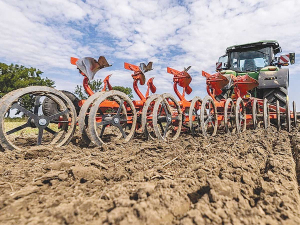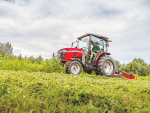As a sign of the times, a sharp downturn in the global demand for tractors and machinery has seen some of the global players announcing lacklustre half yearly results.
AGCO, the parent company of Fendt, Massey Ferguson and Valtra, has reported net sales of around US$6.2 billion, a decrease of 13.7% on the same six months in 2023. This result is on the back of a 12.1% downturn in the first three months of the year, meaning the second quarter, with sales of US$3.2 billion was down 15.1% compared to 2023.
The company says the result paints a picture of weakening market conditions and significant production cuts, the latter to help reduce the company’s and dealer inventories. They also note that declines in commodity prices and subsequently reduced farm income has tempered farmer sentiment, further reducing global demand.
A spokesman for the company commented, “In the first half of 2024, retail tractor industry demand fell by an average of 8.0% across the three major regions of North America, South America and Europe.” In Western Europe, retail tractor sales decreased 5.0% during the first half of 2024, while growth in Germany, Turkey and France was offset by reduced sales across all other European markets – the weakest conditions eventuating in Italy, the UK and Scandinavia. Looking ahead, AGCO expects demand to soften for the rest of 2024, with a full year of net sales at around US$12.5 billion.
In the blue and maroon tractor camp, CNH Industrial is blaming lower demand for the 16% drop in net sales in its second three months of this year to US$5.49 billion. While Agriculture – Case IH, New Holland and Steyr – delivered the largest share of the total at US$3.91 billion, the figure was 20% lower than the US$4.89 billion in 2023.
Industry volume was down 11% year on year for tractors under 140hp in North America, but up 2% for 140hp+ tractors. The combine market was down 5%, South American tractor demand was down 10% and combines was down 26%, while by contrast, Asia Pacific tractor sales were up 1% and combines demand up 4%. Again, looking ahead, forecasts suggest weaker demand, with agricultural machinery net sales likely to be down by 15% to 20%.
On the machinery front, Kuhn Group net sales in the first six months of this year fell to around €733 million, a fall of around 17%. Kuhn Group parent company Bucher Industries says lower prices for agricultural products, higher interest rates and fewer subsidies continue to make farmers cautious in terms of investment.
Like the tractor sector, inventories of machinery in the dealer network remains high, leading to lower demand in all regions, especially in Brazil, Europe and North America. For the second half of the year, expected demand will continue to be affected by the volatile environment. Overall, Kuhn Group expects sales to decrease and the operating profit margin to be lower.










